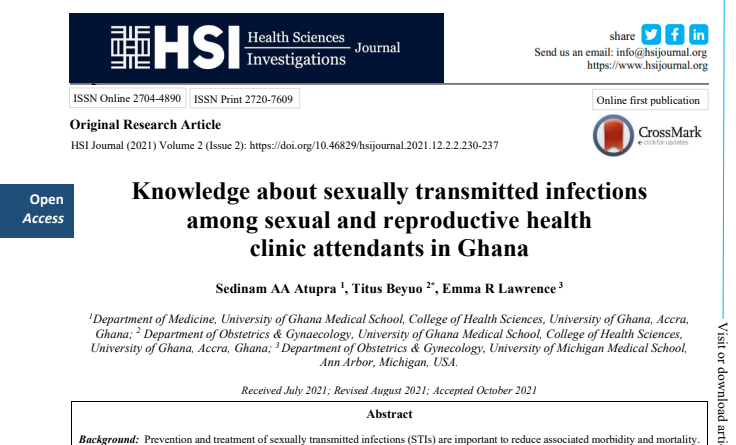Knowledge about Sexually Transmitted Infections Among Reproductive Health Clinic Attendants in Ghana
Abstract
Background: Prevention and treatment of sexually transmitted infections (STIs) are important to reduce associated morbidity and mortality. Awareness and knowledge about STIs promote healthy reproductive health behaviors.
Objective: This study assessed the knowledge about STIs and their prevention among sexual and reproductive health clinic attendants.
Methods: A survey was administered to attendants at two reproductive health clinics in Ghana. Questions included demographics, utilization of reproductive services, knowledge about STIs, and personal behaviors regarding STI prevention. A STI Knowledge Score was created by summing correct responses to thirty-three factual questions on STI transmission, prevention, and symptoms.
Results: Of 155 participants, 85.8% reported any knowledge about STIs, and 56.8% had been educated about STIs by the sexual and reproductive health clinic. Initial education about STIs was most commonly encountered at school (56.3%). The majority of participants correctly identified gonorrhea (87.1%), syphilis (65.8%), and HIV (94.8%) as STIs, however, less than half correctly identified chlamydia (46.5%) and hepatitis B (45.2%). Regarding knowledge of transmission, 93.5% knew that STIs are transmitted through unprotected intercourse, however 36.1% incorrectly believed that STIs could be spread by sharing cups and spoons. The majority (90.2%) correctly identified condoms as a method of STI prevention. On a 33-point STI Knowledge Score, participants had a mean of 21 (+/- 1.2); 21.2% had “poor” knowledge, 50.4% had “satisfactory” knowledge and 28.4% had “excellent” knowledge. Overall, 79% of participants felt that they were prepared to share information about STIs with others. A higher level of knowledge was associated with a greater preparedness to share.
Conclusions: Attendants of sexual and reproductive health clinics have a high general knowledge about STIs, however important knowledge gaps exist. We highlight the importance of sexual and reproductive health clinics providing comprehensive STI counseling.


